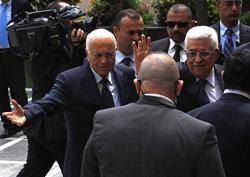Arab foreign ministers meeting in Cairo have renewed their commitment to give $100m in monthly aid to the government of Palestinian President Mahmoud Abbas.
The ministers also urged Arab governments falling behind on payments to the Palestinians to swiftly come up with the money, according to the Associated Press news agency.
The pledge, made on Wednesday in the Egyptian capital, came hours after Israel announced a partial freeze in high-level contacts with the Palestinians in retaliation for their bid sign international conventions.
Under interim peace deals, Israel collects and transfers to the Palestinian Authority (PA) some $100m a month in taxes on goods imported into the Palestinian territories. Israel has previously frozen the payments during times of heightened tensions.
Though Israel did not mention such measures on Wednesday, Palestinian Foreign Minister Riyad al-Malki said the Israeli government had "indicated" it would withhold the revenues. He did not say how that message had been delivered.
“We are committed as Palestinians and Arabs to the negotiation process and the April 29 date and continuing to deal with the efforts that the American administration and John Kerry are making to find a way out of this crisis," he said.
Benjamin Netanyahu, the Israeli prime minister, on Wednesday ordered a halt to high-level contacts with the Palestinians on non-security related issues, but exempted his chief peace negotiator from the ban, government officials said.
One Israeli official called Netanyahu's order a response to "the Palestinians" grave violation of their commitments in the framework of the peace talks" - an apparent reference to their signing of 15 international conventions last week.
The edict came a day after John Kerry, the US secretary of state, suggested that Israel's announcement on April 1 of plans to build about 700 housing units in East Jerusalem was the immediate cause of peace talks plunging into crisis.
Al Jazeera's Stefanie Dekker, reporting from Ramallah in the West Bank, noted that the two sides had not yet halted talks and had continued peace efforts.
"Netanyahu's announcement will not have any impact on the ground, but it certainly shows Israel wants to complicate matters and there is a fear of escalation," she said.
No more meetings
An Israeli official said Israeli cabinet members, directors-general of government ministries and other senior bureaucrats would no longer be allowed to meet their counterparts in the Palestinian Authority, which exercises limited self-rule in the occupied West Bank.
Justice Minister Tzipi Livni, who heads Israel's negotiating team in the troubled US-brokered peace process, and defense and security officials could continue to engage with the Palestinians, the official said.
There was no immediate Palestinian comment on Netanyahu's decision and no clear indication of what would be the practical outcome of the move.
Israeli and Palestinian officials have been cooperating for years on civilian issues such as the environment, water and energy.
At the weekly meeting of his cabinet on Sunday, Netanyahu had threatened to retaliate for Abbas's signing of the international agreements, including the Geneva Conventions covering the conduct of war and occupation.
Palestinian officials said Abbas signed the conventions in response to Israel's failure to carry out a promised release of several dozen Palestinian prisoners four days earlier. The Palestinians were further angered by the subsequent settlement announcement.
Israel said the tender to build new houses in East Jerusalem had already been issued last year and was resubmitted because there had been no initial takers.
PHOTO CAPTION
Arab League Chief Nabil al-Arabi (L) greets Palestinian President Mahmoud Abbas, who waves to the media, before attending an Arab Foreign Ministers' meeting at the Arab League headquarters in Cairo April 9, 200014.
Al-Jazeera


 Home
Home Discover Islam
Discover Islam Quran Recitations
Quran Recitations Lectures
Lectures
 Fatwa
Fatwa Articles
Articles Fiqh
Fiqh E-Books
E-Books Boys & Girls
Boys & Girls  Hajj Rulings
Hajj Rulings Hajj Fatwas
Hajj Fatwas














